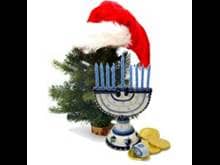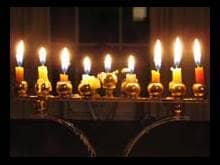
The December holidays present particular challenges for Jewish-Christian families. This is an emotionally fraught time when couples recall the family traditions they grew up with and think about what they want their kids to experience--and what they'll miss, if the decision has been made to practice one faith. The following tips from interfaith couples emphasize compromise and creativity. What works best, they say, is to recognize what is important to each of you and help the other to get what you most want and need.
Choose the Most Meaningful Elements
 "We decided to focus on what is most important to each of us," says Jacob, a culturally Jewish man married to a Christian. "We don't have a Christmas tree, but the smell of greenery around the house at that time of year is something that Diane really likes. So we put up greenery, along with some stars of David." Elizabeth, a mom who is planning to convert to Judaism, says, "I couldn't live with my family not having a Christmas Eve dinner. We invite my side of the family. We don't put up one stitch of Christmas, and there are always Hanukkah decorations all over the place. My parents and grandparents have never turned us down. The way we explain it to our kids is that it happens to be Christmas Eve, and we're having my relatives over for a really nice dinner. But this is their holiday, not ours."
"We decided to focus on what is most important to each of us," says Jacob, a culturally Jewish man married to a Christian. "We don't have a Christmas tree, but the smell of greenery around the house at that time of year is something that Diane really likes. So we put up greenery, along with some stars of David." Elizabeth, a mom who is planning to convert to Judaism, says, "I couldn't live with my family not having a Christmas Eve dinner. We invite my side of the family. We don't put up one stitch of Christmas, and there are always Hanukkah decorations all over the place. My parents and grandparents have never turned us down. The way we explain it to our kids is that it happens to be Christmas Eve, and we're having my relatives over for a really nice dinner. But this is their holiday, not ours."2. Accept That There Will Be Compromises
 "I grew up in a Conservative Jewish household," says Jessica. "When Peter and I got married, we decided that there would be no Christian element in our life whatsoever. But life is full of compromises. After our parents had died, it became much more important to Peter to have the tree. I felt he really needed it. I think that when you lose your parents, it really changes things around. You begin to wish that you could go back to some of your childhood experiences and preserve some of them for your own family. And I decided that this was something I could give Peter that didn't have to take anything away from me."
"I grew up in a Conservative Jewish household," says Jessica. "When Peter and I got married, we decided that there would be no Christian element in our life whatsoever. But life is full of compromises. After our parents had died, it became much more important to Peter to have the tree. I felt he really needed it. I think that when you lose your parents, it really changes things around. You begin to wish that you could go back to some of your childhood experiences and preserve some of them for your own family. And I decided that this was something I could give Peter that didn't have to take anything away from me."3. Realize That It's an Emotional Subject
 "Every year there is a battle between my husband and me over which gifts are going to be the Hanukkah gifts and which are going to be the Christmas gifts," says Gloria, whose Jewish husband agreed to raise the children Christian. "It suddenly hit me this year why there is tension over this same issue. I know my husband is feeling, If you give the nicer gift at Christmas, does that mean that Hanukkah isn't as important? And this year when we got into that debate, I found myself bursting into tears. It's amazing to me that even though we've been together 25 years, these issues still exist between us."
"Every year there is a battle between my husband and me over which gifts are going to be the Hanukkah gifts and which are going to be the Christmas gifts," says Gloria, whose Jewish husband agreed to raise the children Christian. "It suddenly hit me this year why there is tension over this same issue. I know my husband is feeling, If you give the nicer gift at Christmas, does that mean that Hanukkah isn't as important? And this year when we got into that debate, I found myself bursting into tears. It's amazing to me that even though we've been together 25 years, these issues still exist between us."4. Support Each Other As Much As You Can
 Debbie is a practicing Catholic raising the kids to respect both faiths. "The point is both of us support the other," says Debbie. "I think at least on my part, I have reinforced his holidays. I go way out of my way. And Mark spends a lot of time getting things ready for Christmas. I think that we not only accept that the other person has different holidays, but we embrace them and really encourage them. There are limits. Mark wants no lights outside the house. His perspective is, 'What we do inside our house is our business, but I'm not trying to broadcast to the world that we're Christians.' So that's fine."
Debbie is a practicing Catholic raising the kids to respect both faiths. "The point is both of us support the other," says Debbie. "I think at least on my part, I have reinforced his holidays. I go way out of my way. And Mark spends a lot of time getting things ready for Christmas. I think that we not only accept that the other person has different holidays, but we embrace them and really encourage them. There are limits. Mark wants no lights outside the house. His perspective is, 'What we do inside our house is our business, but I'm not trying to broadcast to the world that we're Christians.' So that's fine."5. Celebrate Outside the Home
 Karen, a Catholic, says, "We visit my parents at Christmas. My husband Stuart is Jewish, and he's willing to go to anybody else's house for Christmas. It's just that he does not want Christmas in our house." But realize that the situation can change. "We've just always done Christmas at my mom's house," says Eileen, a Presbyterian. "We would tell our kids that Santa went to Grandma's house, and that we have Hanukkah. But my mom passed away last spring, so we just kind of skipped Christmas this year. We did make the commitment to raise the boys Jewish, and I think having a Christmas tree is contradictory to that. Probably we'll just start developing more Hanukkah traditions."
Karen, a Catholic, says, "We visit my parents at Christmas. My husband Stuart is Jewish, and he's willing to go to anybody else's house for Christmas. It's just that he does not want Christmas in our house." But realize that the situation can change. "We've just always done Christmas at my mom's house," says Eileen, a Presbyterian. "We would tell our kids that Santa went to Grandma's house, and that we have Hanukkah. But my mom passed away last spring, so we just kind of skipped Christmas this year. We did make the commitment to raise the boys Jewish, and I think having a Christmas tree is contradictory to that. Probably we'll just start developing more Hanukkah traditions."6. Give Kids Both Traditions
 Murray comes from a Conservative Jewish background. "When it came to children, our approach was that we were going to give them everything. We have two daughters. They realized from the time they could talk that they came from two parents who had different religious backgrounds. And we explained to them the differences between the religions and the respect we have for them both. When they went to school and someone asked, 'Who celebrates Christmas?' they raised their hands. 'Who celebrates Hanukkah?' They raised their hands. These were the kids who wore both a chai and a cross to school. That was their own little 'red badge of courage.' They loved that branding that made them a little different."
Murray comes from a Conservative Jewish background. "When it came to children, our approach was that we were going to give them everything. We have two daughters. They realized from the time they could talk that they came from two parents who had different religious backgrounds. And we explained to them the differences between the religions and the respect we have for them both. When they went to school and someone asked, 'Who celebrates Christmas?' they raised their hands. 'Who celebrates Hanukkah?' They raised their hands. These were the kids who wore both a chai and a cross to school. That was their own little 'red badge of courage.' They loved that branding that made them a little different."7. Keep in Mind the Bottom Line
 "I don't know if our kids will ever make a choice on their own about one religion or the other, at least not for a long time," says Ruth, whose children are being raised in both traditions equally. "We'll continue to have our Christmas tree each year and decorate it in blue-and-silver Hanukkah colors. We have our own traditions, and they will have their own traditions. They will probably meet someone, and depending on who that person is, Jewish or Protestant or Catholic, maybe they'll gravitate in some direction. But hopefully they'll continue to keep the parts of the religion that matters to them. The bottom line is to help them to become good people and have good morals, good ethics, good understanding, and love for each other and God."
"I don't know if our kids will ever make a choice on their own about one religion or the other, at least not for a long time," says Ruth, whose children are being raised in both traditions equally. "We'll continue to have our Christmas tree each year and decorate it in blue-and-silver Hanukkah colors. We have our own traditions, and they will have their own traditions. They will probably meet someone, and depending on who that person is, Jewish or Protestant or Catholic, maybe they'll gravitate in some direction. But hopefully they'll continue to keep the parts of the religion that matters to them. The bottom line is to help them to become good people and have good morals, good ethics, good understanding, and love for each other and God."8. Emphasize Family Strength
 "Since my oldest child was born, we have always celebrated every holiday, Jewish and Christian, in our home. And everyone came," says Murray, whose kids are being raised in both faiths. "We'd have a lot of family and friends over. We did Christmas, Hanukkah, Easter, Passover, Rosh Hashanah. Everything. We were fun holiday people. We always had lots of decorations. I made sure there were games. The main thing is that there is a family gathering and a time of importance, and we enjoy it. And so what we accentuated more than Judaism or Catholicism was family. That was the strength of what we did."
"Since my oldest child was born, we have always celebrated every holiday, Jewish and Christian, in our home. And everyone came," says Murray, whose kids are being raised in both faiths. "We'd have a lot of family and friends over. We did Christmas, Hanukkah, Easter, Passover, Rosh Hashanah. Everything. We were fun holiday people. We always had lots of decorations. I made sure there were games. The main thing is that there is a family gathering and a time of importance, and we enjoy it. And so what we accentuated more than Judaism or Catholicism was family. That was the strength of what we did."



Tidak ada komentar:
Posting Komentar